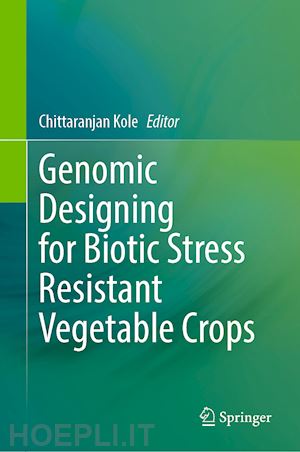
Questo prodotto usufruisce delle SPEDIZIONI GRATIS
selezionando l'opzione Corriere Veloce in fase di ordine.
Pagabile anche con Carta della cultura giovani e del merito, 18App Bonus Cultura e Carta del Docente
Biotic stresses cause yield loss of 31-42% in crops in addition to 6-20% during post-harvest stage. Understanding interaction of crop plants to the biotic stresses caused by insects, bacteria, fungi, viruses, and oomycetes, etc. is important to develop resistant crop varieties. Knowledge on the advanced genetic and genomic crop improvement strategies including molecular breeding, transgenics, genomics-assisted breeding and the recently emerging genome editing for developing resistant varieties in vegetable crops is imperative for addressing FPNEE (food, health, nutrition. energy and environment) security. Whole genome sequencing of these crops followed by genotyping-by-sequencing have facilitated precise information about the genes conferring resistance useful for gene discovery, allele mining and shuttle breeding which in turn opened up the scope for 'designing' crop genomes with resistance to biotic stresses.
The nine chapters each dedicated to a vegetable crop or crop-group in this volume will deliberate on different types of biotic stress agents and their effects on and interaction with crop plants; will enumerate on the available genetic diversity with regard to biotic stress resistance among available cultivars; illuminate on the potential gene pools for utilization in interspecific gene transfer; will brief on the classical genetics of stress resistance and traditional breeding for transferring them to their cultivated counterparts; will enunciate the success stories of genetic engineering for developing biotic stress resistant varieties; will discuss on molecular mapping of genes and QTLs underlying biotic stress resistance and their marker-assisted introgression into elite varieties; will enunciate on different emerging genomics-aided techniques including genomic selection, allele mining, gene discovery and gene pyramiding for developing resistant crop varieties with higher quantity and better quality; and will also elaborate some case studies on genome editing focusing on specific genes for generating disease and insect resistant crops.
Prof. Chittaranjan Kole is an internationally reputed scientist with an illustrious professional career spanning over thirty-seven years and original contributions in the fields of plant genomics and biotechnology leading to the publication of more than 150 research articles in globally leading journals. He has edited over 150 books for the leading publishers of the world including Springer Nature, Wiley-Blackwell and Taylor & Francis Group. His works and editing acumen have been appreciated by seven Nobel Laureates including Profs. Norman Borlaug, Arthur Kornberg, Werner Arber, Phillip Sharp, Günter Blobel, Lee Hartwell and Roger Kornberg. Previously he was a Visiting Professor in The Pennsylvania State University and Clemson University. He also served as the Vice-Chancellor of the BC Agricultural University in India. He is also the President of the International Climate-Resilient Crop Genomics Consortium (ICRCGC), International Phytomedomics and Nutriomics Consortium (IPNC). and Genome India International (GII).











Il sito utilizza cookie ed altri strumenti di tracciamento che raccolgono informazioni dal dispositivo dell’utente. Oltre ai cookie tecnici ed analitici aggregati, strettamente necessari per il funzionamento di questo sito web, previo consenso dell’utente possono essere installati cookie di profilazione e marketing e cookie dei social media. Cliccando su “Accetto tutti i cookie” saranno attivate tutte le categorie di cookie. Per accettare solo deterninate categorie di cookie, cliccare invece su “Impostazioni cookie”. Chiudendo il banner o continuando a navigare saranno installati solo cookie tecnici. Per maggiori dettagli, consultare la Cookie Policy.